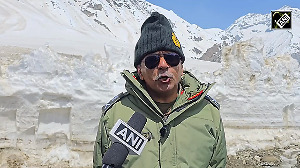Support for independence or union with neighbouring Pakistan still runs deep among Kashmir's Muslim majority, reports the Los Angeles Times.
In an article titled 'Civilians Find Little Refuge in Kashmir,' it says that "although millions of spectators in the two countries celebrate warming relations by watching a series of cricket matches pitting Indians against Pakistanis, an average of five people are dying daily in the insurgency that still torments Kashmir.
"The war's victims have come from all religious groups - Hindu, Buddhist, Muslim, Christian and Sikh. But the mainly Muslim Kashmir Valley has suffered the brunt of the violence," it says.
The article quotes several people who complain of human rights abuses at the hands of the Indian security forces, including the use of local villagers as "human shields" in the war against terrorists.
"Mufti Mohammed Syed, the chief minister of India's Jammu and Kashmir state, says the police and military rarely commit abuses in the territory and that violators are brought to justice. But only one member of the security forces has been punished since Syed took office, according to the non-governmental Public Commission on Human Rights. The police officer was suspended after an inquiry concluded that a 45-year-old mason who died in custody did not hang himself, as police claimed," says the article datelined Chattibandi, a village 30 miles north of Srinagar.
It adds, "A senior Indian police source said the soldiers did nothing wrong by using civilians in a [recent] military operation - in which six soldiers also died - and said the men participated willingly for pay. Several villagers said the military initially tried to cover up the civilian deaths by claiming they were militants. The army has not provided evidence that guerrillas were captured or killed in the operation."
The article then refers to the killing of Abdul Rashid Bhat a local carpenter who was hauled out his house "just after midnight. The visitors were wearing black balaclavas over their faces and carrying Kalashnikov assault rifles.
"Bhat's corpse was found the next day, about a mile from his home in the village of Narabal, 25 miles northwest of Srinagar. His family thinks the masked gunmen may have been ikhwani (former terrorists) working for the security forces. The evidence suggests that the 35-year-old carpenter was murdered for political revenge, perhaps by a shadowy police unit called the Special Task Force, said human rights worker Khurram Parvez of the Jammu and Kashmir Coalition of Civil Society."
Bhat's 18-year-old son, Bilal Ahmed, insisted that his father was a poor man who had nothing to do with the militants. He added that deaths such as his would draw new recruits to the guerrilla ranks. "We feel that if one brother in a family is killed by the security forces," he said, "the other brother will take up the gun for revenge."







 © 2025
© 2025